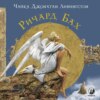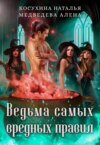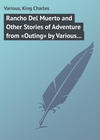Читать книгу: «Harper's Young People, December 2, 1879», страница 6

Our young friends must not be impatient if their communications are not noticed immediately. Our space is limited, and we answer or print letters in the order in which they are received. The following pleasant note comes from a young correspondent in Paterson:
Dear "Young People,"—If all the boys and girls were as glad to see you as I was, you must have received a very flattering welcome. We have felt the want of a cheap, first-class weekly paper so much that we are able to appreciate you now that we have you. There are several weeklies published for the "young," but the great objection to them is that half are too dry, and the other half too sensational. You are neither, but very interesting.
In answer to a question accompanying the above note, we would say that there is no limit to the age of our contributors.
George S. Vail.—We will accept original puzzles if they are very good. They must, in all cases, be accompanied by a full solution. Your chicken story is very pretty, but we have no room to print it.
Chester B. Fernald.—The full operation in figures should be sent with all answers to mathematical puzzles.
Lyman C.—Your land-turtle will eat pieces of pear or sweet apple, bread, cake, and many other things. It will also live many months without eating at all. You can keep it in a box, and it will be happier if you give it a little earth to dig in. If the earth is deep enough, it will make a burrow and sleep in it until next spring. We knew a little girl who received a present of two land-turtles, which she placed in the yard. In a few days she was unable to find them, and gave them up for lost. The next spring, six months afterward, she was digging in her flower beds, when, to her astonishment, she found her two lost pets, who opened their eyes on being disturbed, and crawled sluggishly out of their hole. They had been asleep all through the cold weather, for turtles are very long lived, and they can easily give a whole winter to a single nap. Rev. Mr. Wood, in a note to White's Natural History of Selborne, gives a very interesting account of a tame turtle which he allowed to crawl about his study. This turtle showed a great genius for climbing, and at one time actually succeeded in scrambling upon a footstool. He says: "Its food consisted of bread and milk, which it ate several times a day, drinking the milk by scooping up some of it in its lower jaw, and then by throwing its head back the milk ran down its throat."
Young Chemist.—Spread on your paper first a solution of iodide of potassium, then a solution of nitrate of silver. Iodide of silver forms, and saturates the paper. The excess of nitrate of silver and the heavy yellow powder which forms are now washed off, and the paper is ready for the camera. The picture may be developed by a solution of gallic acid mixed with a very small quantity of an aqueous solution of acetic acid and nitrate of silver. The picture is fixed by washing with hyposulphite of soda. If you wish to derive any pleasure from photography, you would better drop the old-fashioned paper process, and turn your attention to ferrotypes, or negatives on glass, as with them good results are more easily obtained than with paper.
We acknowledge very pretty and neatly written letters from St. Clair Nichol, Listowel, Ontario, and Charles L. Benjamin (nine years old), Washington, D. C., both containing correct information respecting Sir Rowland Hill.
Clarissa H. H.—Your answer to No. 4 of the mathematical puzzles is right. If you look carefully you will discover why the others are wrong.
G. A. Page sends correct answers to Nos. 1, 3, and 4 of the mathematical puzzles in our second number; also to numerical charade. Many thanks to "an instructor and lover of young people" for her kind note. We are sorry it is anonymous.
A correspondent sends answers to puzzles which we have not considered, as no signature accompanies them. Our young friends will please sign their full names to communications, which we will not print if so requested.
Harper's Young People
Harper's Young People will be issued every Tuesday, and may be had at the following rates:
Four cents a number.
Single subscriptions for one year, $1.50; five subscriptions, one year, $7.00: payable in advance. Postage free.
Subscriptions may begin with any number. When no time is specified, it will be understood that the subscriber desires to commence with the number issued after the receipt of order.
Remittances should be made by Post-office Money Order, or Draft, to avoid risk of loss.
Published by HARPER & BROTHERS, New York.
A LIBERAL OFFER FOR 1880 ONLY
☞ Harper's Young People and Harper's Weekly will be sent to any address for one year, commencing with the first number of Harper's Weekly for January, 1880, on receipt of $5.00 for the two Periodicals.

"Little Polly, will you go a-walking to-day?"
"Indeed, little Susan, I will, if I may."
"Little Polly, your mother has said you may go:
She was nice to say 'Yes;' she should never say 'No.'"

Six little people out for a walk;
They would let you know where, if they only could talk.

Three tabbies took out their cats to tea,
As well-behaved tabbies as well could be:
Each sat in the chair that each preferred,
They mewed for their milk, and they sipped and purred.
Now tell me this (as these cats you've seen them)—
How many lives had these cats between them?

Yes, it is sad of them—
Shocking to me;
Bad—yes, it's bad of them—
Bad of all three.
Warnings they've had from me,
Still I repeat them—
Cold is the water—the
Fishes will eat them;
Yet they will row about;
Tho' I say "Fie!" to them;
Fathers may scold at it,
Mothers may cry to them.

Will you be my little wife,
If I ask you? Do!
I'll buy you such a Sunday frock,
A nice umbrella too.
And you shall have a little hat,
With such a long white feather,
A pair of gloves, and sandal shoes,
The softest kind of leather.
And you shall have a tiny house,
A bee-hive full of bees,
A little cow, a largish cat,
And green sage cheese.

Poor Dicky's dead!—The bell we toll,
And lay him in the deep, dark hole.
The sun may shine, the clouds may rain,
But Dick will never pipe again!
His quilt will be as sweet as ours—
Bright buttercups and cuckoo-flowers.





















